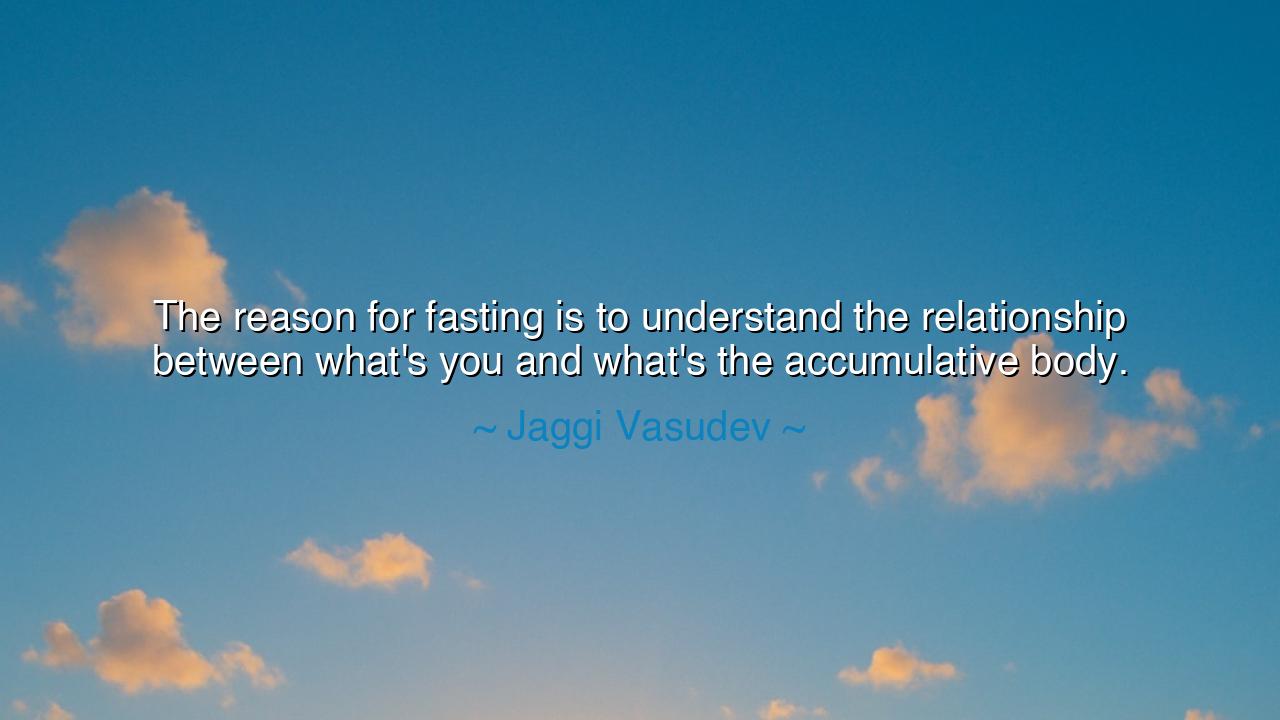
The reason for fasting is to understand the relationship between
The reason for fasting is to understand the relationship between what's you and what's the accumulative body.






The words of Jaggi Vasudev carry the stillness of a sage and the thunder of truth: “The reason for fasting is to understand the relationship between what’s you and what’s the accumulative body.” At first, the saying seems simple, like advice for health. Yet beneath it lies a river of ancient wisdom, flowing through centuries of spiritual practice. For fasting has never been only about food; it is a mirror held to the soul, a way to see where the self ends and the body begins.
The accumulative body, as Vasudev names it, is the flesh we inherit and gather. It is made of the food we eat, the water we drink, the air we breathe. It is built from the world, sustained by the world, and one day, it will return to the world. But the you—the spark of awareness, the flame of consciousness—does not belong to this passing accumulation. By fasting, we weaken the hold of the body and strengthen the clarity of the soul. Hunger sharpens the line between the eternal self and the transient flesh.
The ancients understood this deeply. In the deserts of Judea, Christ fasted for forty days, facing hunger not as punishment, but as purification. In his trial, he learned to separate the eternal spirit from the craving of the body. In India, the rishis and yogis would withdraw into forests, abstaining from food to discover the same truth—that the self is not the stomach, nor the senses, but something vast and enduring. Even the Stoics of Greece practiced restraint, testing themselves against want, to prove that they were masters of their bodies, not slaves to them.
Consider also the story of Mahatma Gandhi, who fasted not only for personal clarity but as a weapon of moral power. Through fasting, he reminded both himself and his people that the body is not the master of the will. Hunger could gnaw at his flesh, but his spirit, unshaken, grew only stronger. Gandhi’s fasts revealed the same ancient truth Vasudev speaks of: the relationship between the self and the accumulative body is one of rider and horse. The body carries us, but it must never command us.
This teaching is both liberating and humbling. It frees us from the tyranny of desire. When hunger, craving, and habit rise, we remember: this is not me, this is the accumulative body, seeking to preserve itself. And yet it humbles us, for we realize that this body, though not the true self, is still a sacred vessel. To understand its needs but not be ruled by them is the balance of wisdom.
The lesson, O seeker, is this: practice fasting not only to cleanse the body, but to reveal the self. When you refrain from food, do not think only of what is denied—think of what is unveiled. Notice the difference between the voice of the stomach and the voice of the spirit. Learn to hear the whisper of your true self, quiet but steady beneath the clamors of flesh.
Practical wisdom flows from this: begin with small acts of restraint. Skip one meal and watch the mind’s restlessness. Fast for a day and observe the separation between craving and awareness. Extend this practice not only to food but to desires of comfort, luxury, and distraction. Each time you deny the body, you strengthen the self. Each time you remember this truth, you loosen the chains of the accumulative body and walk closer to freedom.
So let Jaggi Vasudev’s words echo like a mantra: “The reason for fasting is to understand the relationship between what’s you and what’s the accumulative body.” For when this truth is understood, hunger becomes a teacher, and restraint becomes liberation. Then the self shines clear, like the sun breaking through clouds, radiant and eternal, unbound by the fleeting shadows of flesh.






DTNg duc thanh
I find this quote intriguing because it shifts the perspective on fasting from a physical challenge to a spiritual exploration. The idea of understanding what’s ‘you’ and what’s the ‘accumulative body’ suggests a deeper purpose behind fasting. How do you think fasting affects our relationship with the body? Is it a way to detach from materialism and reconnect with a higher sense of self?
NTDiem Thanh Nguyen Tran
Vasudev’s perspective on fasting is quite profound. It suggests that fasting is a practice that allows us to transcend the physical and focus on the deeper connection with the self. Do you think fasting can help one achieve this kind of mental and spiritual clarity, or is it just another way to control bodily urges? What role does the mind play in a fasting practice?
PDPhong Do
This quote brings up an interesting concept about fasting, where it’s not just about depriving the body but about understanding the connection between the body and the mind. Do you believe fasting helps us break free from our physical needs and desires, allowing us to reconnect with our inner self? Can fasting be a tool for greater clarity in our lives?
LHNhat linh Ho
Jaggi Vasudev’s quote makes me think about how fasting is more than just abstaining from food. It seems like a spiritual practice aimed at understanding the distinction between our true selves and the physical body. Do you think fasting helps create a clearer separation between mind and body? How does fasting challenge our usual attachment to our bodies, and can it lead to deeper self-awareness?